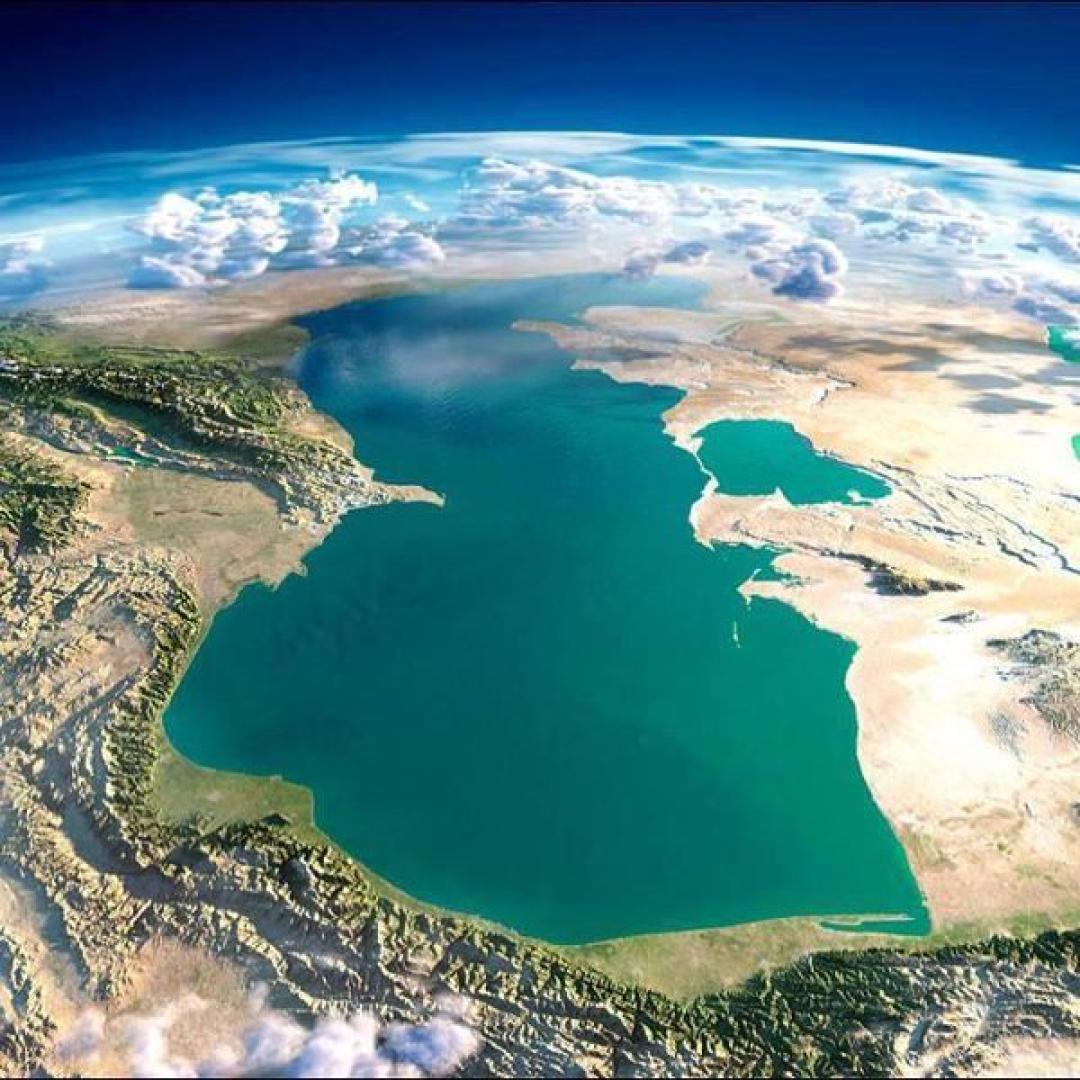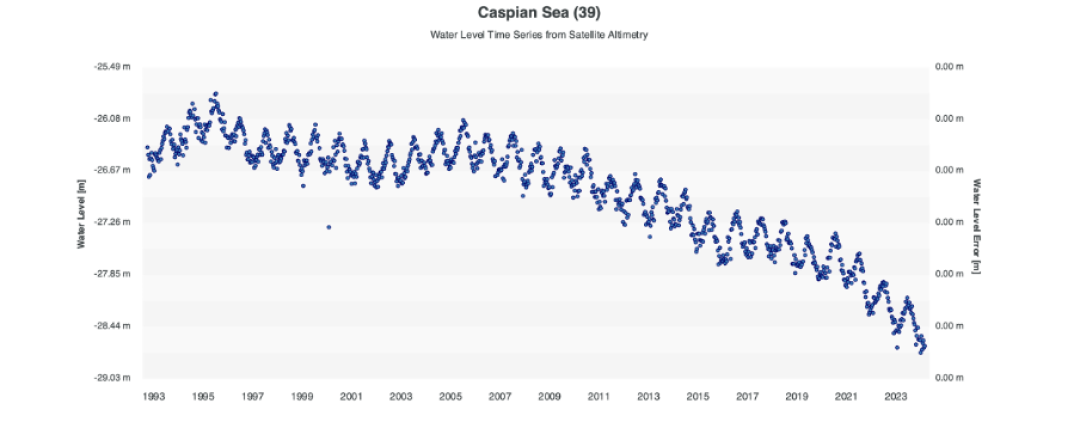
Rohit Samant: The Caspian Sea Is Drying Up, and Our Geopolitical Certainties Are Evaporating

The Caspian Sea's drying up is man-made. And yet the change this development brings to our geopolitical certainties is reminiscent of the German proverb “Der Mentsch tracht, un Gott lacht,” roughly translated as “God laughs at our plans.”
The Trans-Caspian International Transport Route, or Middle Corridor, has attracted billions of dollars in investment. Geographically, it is the shortest route from Europe to China. The idea of an alternative route to China that circumvents reliance on Belarus and Russia has been the subject of intense planning, capturing the diplomatic imagination. Billions have been spent to turn this vision into a master plan. However, climate change is undermining everyone’s claim to connectivity: the ports of Astrakhan (Russia), Baku (Azerbaijan), Turkmenbashi (Turkmenistan), Aktau (Kazakhstan), and Anzali (Iran) could soon be too shallow. Logistics rely on scale – big depth, big infrastructure, big vessels – to carry grain, energy, oil, dry cargo, polypropylene, and fertilizers. The Caspian Sea is evaporating quickly. This anthropogenic disaster's scale is now beginning to sink in.
The implications of this change have been seeping into the policy horizon, with the first virtual UN Scientific Conference on Climate Change in the Caspian Region taking place at the tail end of the pandemic crisis, in October 2021. Caucasus Watch reached out to Rohit Samant, who is currently at the University of Münster. While at the Department of Geosciences of the University of Bremen, Rohit Samant authored his Master Thesis on the Caspian Sea, which resulted in a research article co-authored with Dr. Matthias Prange. Climate change model datasets (ERA 5, 15 CMIP6), the results of the EU Horizon 2020 research project PRIDE (Pontocaspian Rise and Demise), and the work of Dr. Prange, Dr. Thomas Wilke, and Frank Wesselingh formed the basis of the study (2022-2023).Satellite imagery confirms the conclusions of this work, which are largely uncontested.
The objective of this interview is to disseminate the grim significance of what is now known about the region’s geopolitics. Anthropogenic activity is changing our certainties. In this sense, there is a very good reason for planning the next COP in Baku.
How fast is the Caspian Sea drying up, and how significant is the loss? Are we moving towards an Aral Sea dry-up?
More water is going out of the sea than what is coming in through rain and river. Future Caspian Sea Level (CSL) change estimated by Samant and Prange (2023) using 15 Coupled Model Intercomparison Project (CMIP) 6 climate models suggests a sea-level decline of 8 to 14 m by the year 2100. The projected decline is influenced by evaporation over the Caspian Sea due to anthropogenic warming. This lake evaporation is not balanced by river discharge or precipitation, thus increasing the water budget imbalance. Things are frequently worse than our projections. The level of the sea is at its lowest point in fifty years.
Caspian Sea Level decline has intensified since 2006 to ~9 cm/year. Recent satellite altimetry measurements indicate a further intensification, with the current Caspian Sea Level at -28.70 meters, comparable to its lowest level in the last 200 years, which was -29 m in the year 1977.Although the current trend is not as rapid as the catastrophic shrinkage of the Aral Sea, a drop of 7-8 m will completely desiccate the northern Caspian basin and shrink the Caspian Sea surface area by 20-25%.
If this trend continues for the next couple of decades, a drop of 1-2 m will pose significant economic and geopolitical challenges for the region. Considering the depths of the middle and southern Caspian basins, the complete disappearance of the Caspian Sea is improbable (in contrast to the shallow Aral Sea, which almost disappeared).
What does that mean in terms of maritime ecosystems? Do you believe we know what's in jeopardy? How much do we know about the Caspian ecosystems?
The unique Caspian ecosystem has been under immense stress over the past century due to the introduction of invasive species, pollution, and over exploitation. As the sea shrinks further, the transformation of the shallow shelves into dry barren land will devastate fish species and the unique mollusks, and crustacean species. Shrinking of the northern Caspian basin will reduce the winter sea-ice area and affect pupping grounds for the endangered Caspian seals. These impacts certainly depend on how fast the sea level changes, but studies focusing on the Caspian ecosystems highlight a complete reorganization of the unique Caspian ecosystems that have evolved in the basin over millions of years.
How long before we see fish floating? Is this the last generation to learn about Caspian caviar?
As the sea level drops, pollution will get worse, to the point that the sturgeon population will shrink. While current potential threats such as poaching and invasive species contribute to the decline of the Caspian species, the projected disappearance of the vast Caspian shelf threatens shallow-water habitats that serve as major food sources and spawning grounds for the fish species, including Caspian sturgeons. River input of nutrients and pollutants will bypass the emerged shelves and directly affect the deeper central basins. Combined with higher productivity driven by rising temperatures, these inputs will reduce oxygen availability in these basins and lead to the emergence of dead zones. These dead zones will impact biodiversity hotspots in both shallow and deeper parts of the Caspian Sea. As a result, there is concern about the future viability of Caspian sturgeon populations and the continuation of Caspian Caviar production.
When we talk about the Caspian Sea getting shallower, which parts of the Caspian Sea are more likely to be affected? How is this going to affect the Iranian-Azerbaijani-Turkmen coastlines? How long before Baku sees a depth of around four meters or less?
The shrinking of the Caspian Sea will lead to the emergence of coastal areas of the middle and southern Caspian Sea. This poses a threat to the wetlands and protected areas like the Volga Delta in Russia, the southeastern coast of Iran, comprising the Miankaleh Lagoon, and the Gulf of Gorgan (the largest Caspian Sea gulf). A drop of 8-9 m will completely desiccate the Kara-Bogaz-Gol and significantly impact the Turkmen coastline. Based on the current trends, a 4-meter drop in sea level could be observed by 2050, which would isolate major ports in Azerbaijan, Russia, and Kazakhstan. The receding coastline has already affected small harbors like Liman in Azerbaijan, indicating a potential challenge for major ports in the future.
What about the Northern Caspian Sea? Do you believe the Volga system will continue to be a major navigation corridor in the region? When do you expect this to become less viable?
The shrinking of the northern Caspian basin will affect transportation through the Volga River, impacting accessibility to the Russian ports of Astrakhan and Makhachkala and the Kazakhstan ports of Aktau and Atyrau. Shallowing of the shelves could increase the risk of serious accidents and make the Volga-Don Canal less viable for large vessels.
Can humans do anything to control, if not reverse, this process?
The complex interplay of human and natural variables makes it difficult to completely reverse the process. However, coordinated efforts among the coastal countries, together with international cooperation, can help reduce the intensified decline. Since river inflow significantly affects the water budget balance, coordinated efforts are needed to manage river inflows. Monitoring water discharge from major rivers and water use for agricultural and industrial purposes is crucial. These countries should prioritize environmental protection over economic goals and increase public awareness about the crisis. Engaging the international community for expertise and technology support is also essential in addressing the Caspian Sea's environmental challenges.
Interview conducted by Ilya Roubanis

See Also


Irina Mamulashvili: Electoral Interference is a Playbook, not a Recipe

Giorgi Gakharia: The EU Should Engage Georgia Despite Its Democratic Backsliding

Peace or Capitulation? Shahverdyan on Armenia-Azerbaijan Agreement and the Nagorno-Karabakh Crisis

Ali Mousavi Khalkhali: Iran Will Avoid Conflict in the Caucasus

